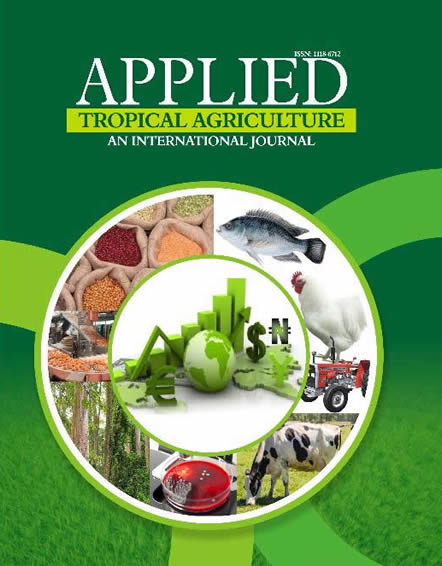This study was carried out to determine the effect of two anaesthetic agents; clove oil and 2-phenoxyethanol on Clarias
gariepinus juvenile. Clove oil was mixed with ethanol in ratio 1:1, to aid its solubility in water. Also, 5gm of 2-
phenoxyethanol was mixed with 5ml ethanol to make it miscible in water. A total of 240 juvenile were used, sixty fishes
were anaesthetized at different concentration of clove oil (0, 0.5, 1.0, 1.5, 2.0, 2.5ml/l) and another sixty anaesthetized at
different concentration of 2-phenoxyethanol (0, 1.0, 1.5, 2.0, 2.5, 3.0 mg/l). The physio-chemical properties of water and
haematological parameters of fish exposed to anaesthetics were measured to know the effects of the anaesthetic agents on
the test fish blood. Single factor analysis of variance (ANOVA) was used to analyze the variables studied. The induction
time decreased with increased concentration while the recovery time increased with increasing concentration. The effective
concentration that gives induction in 194.50± 20.51s and recovery time in 298.00±7.07s for clove oil with no mortality was
2.0ml. Also, 2.5 ml of 2-phenoxyethanol gives 185.00±35.36s induction time and recovery time of 295.00±42.43s. The
result shows significant difference (p<0.05) in haematological variables across the samples. From the experiment, increase
in the concentration of these agents decrease the level of PCV, RBC and Hb while the level of WBC increases with
increasing concentration. In conclusion, clove oil is the most suitable agent for juvenile African catfish when compared 2-
phenoxyethanol based on the quicker induction and recovery time when clove oil was administered.
PAPER TITLE :COMPARATIVE EFFECTS OF CLOVE OIL AND 2-PHENOXYL ETHANOL ON THE ANAESTHETIC AND HAEMATOLOGICAL PROPER
APPLIED TROPICAL AGRICULTURE | VOLUME 21 NUMBER 3 2016
Paper Details
- Author(s) : Popoola, O. M.
- Abstract:


